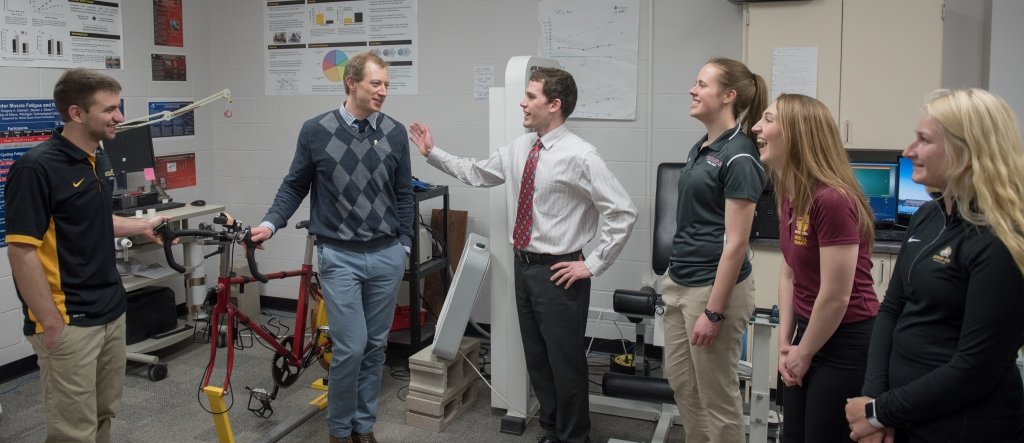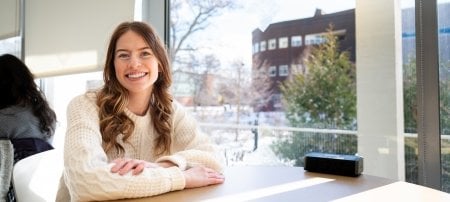Marlee Huskey wanted to deepen her studies in public health and learn more about her Native American culture. The Michigan Technological University senior found an opportunity to do both through an internship that began with intensive research and culminated in a presentation at the national Centers for Disease Control and Prevention (CDC).
Huskey, an exercise science major, is double-minoring in public health and psychology. She graduates in December.
Huskey found advertised openings for the THESIS program on Handshake, an online career-building network founded by Michigan Tech students and now widely used by universities and employers to more accessibly connect students with jobs.
THESIS stands for Tribal Health Experiential Internship Seminar. The program offers an eight-week virtual internship that focuses on promoting tribal public health — and preparing the next generation of leaders in tribal public health. It's funded by the CDC's Office of Minority Health and Health Equity through their John R. Lewis Undergraduate Public Health Scholars Program.
The opportunity to explore topics related to Native American culture and resilience caught her attention.
"I'm a member of the Sault Ste. Marie Tribe of Chippewa Indians. My dad's side is Native American and my mom's side is white," said Huskey. "I grew up mainly surrounded by my mom's side of the family. Because of this, I didn't get much experience with my Native American culture. I was always left wanting to know more. This is why I enjoyed this experience as much as I did — it allowed me to not only learn more about others but to learn more about myself."
Huskey was also intrigued by the chance to deepen her understanding of where her studies could take her professionally.

"Because of my interest in the health field and my public health minor, I thought that this would be an incredible opportunity for me to further explore this side of my education path," she said.
THESIS is one of seven organizations in the Lewis Scholars Program, operating under the Southern Plains Tribal Health Board in Oklahoma City. Interns explore various aspects of public health, including epidemiology and research, through the lens of Native American culture and resilience, according to a THESIS press release, which noted that "Their intensive eight-week journey culminates in the creation of research posters, which they present at the CDC headquarters in Atlanta, Georgia."
Huskey's research topic was "Long-term Arsenic Exposure Effects on Neurological Health of Native American Elders."
Huskey said her THESIS experience was "extremely eye-opening," and that she especially appreciated the inspiring speakers who shared their knowledge and perspectives with program interns.
"I learned so much about creating a research poster and more specifically about my research topic and the health disparities Native Americans face," Huskey said. Her research showed that access to noncontaminated water is an ongoing issue for Native American communities; that the prevalence of arsenic-contaminated wells and water sources is high in states with the largest Native American populations in the nation; and that Native American elders are twice as likely as other ethnicities and races to develop cognitive impairment and neurological disorders. One of Huskey's most impactful observations about the intertwined health and cultural research topic is how long-term arsenic exposure affects memory.
"Getting the chance to present my research at the CDC was amazing, and I met so many wonderful people who were curious to learn more about my topic."
"Native American culture is passed down historically by elders," Huskey said. "The long-term neurological damages of arsenic exposure are targeting elders and their memories, potentially making it difficult to remember traditions and pass them down."
Huskey plans to continue her education by attending graduate school for athletic training. Currently in the midst of the application process, she has a couple of offers and is waiting to hear back from other programs. Wherever her studies take her, she will carry memories of what she learned at Michigan Tech in the classroom and through her work with athletics.
"I decided to come to Michigan Tech because of the amazing opportunity the Athletic Training Student Aide Program would give me. I've been able to work with many athletic trainers here for over 1,200 hours. I've gained more experience than I believe I would have gotten anywhere else," she said. "My favorite memories from my undergraduate years are the times I spent with my fellow students in this program. Traveling to away games, whether it was just to NMU or all the way to Texas, has been a lot of fun and a great experience."
Michigan Technological University is an R1 public research university founded in 1885 in Houghton, and is home to nearly 7,500 students from more than 60 countries around the world. Consistently ranked among the best universities in the country for return on investment, Michigan's flagship technological university offers more than 185 undergraduate and graduate degree programs in science and technology, engineering, computing, forestry, business, health professions, humanities, mathematics, social sciences, and the arts. The rural campus is situated just miles from Lake Superior in Michigan's Upper Peninsula, offering year-round opportunities for outdoor adventure.







Comments